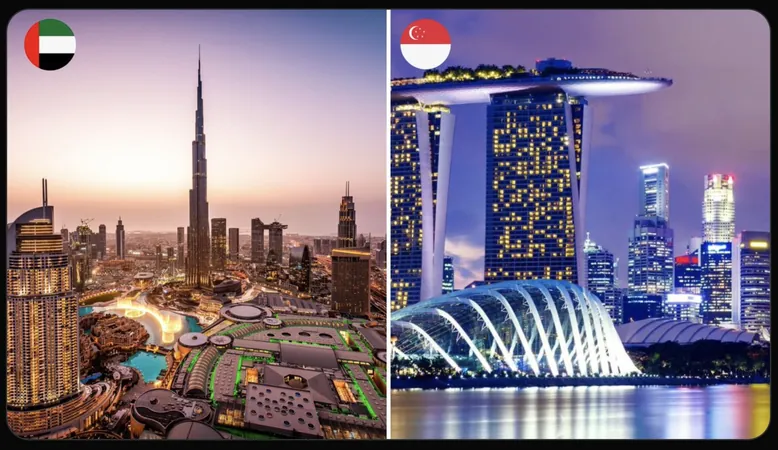
Why an Entrepreneur's Comparison of Singapore and Dubai Has Set Social Media Abuzz
2024-11-01
Author: Daniel
In a recent viral thread that captivated over 14.6 million viewers, Alessandro Palombo, the CEO and co-founder of Jur and Unbound Fund, meticulously compared the living experiences in Singapore and Dubai. The discussion, which sparked widespread engagement on X (formerly Twitter) on October 29, sheds light on the unique advantages and limitations of each metropolis for high-net-worth individuals.
Having spent four formative years in Dubai and establishing two businesses in Singapore, Palombo brought a unique perspective to the table. His playful description of Singapore as “The billionaire’s hub (in flip-flops)” while dubbing Dubai “The tax-free oasis (in Lamborghinis)” reflects his keen observations on the cultural nuances and lifestyle appeal of both cities.
Palombo emphasized that both cities represent “two paths to freedom”. For individuals prioritizing security, stability, and seamless global connectivity, Singapore emerges as the preferable choice. Conversely, those drawn to lucrative tax benefits, easier business environments, and a high-octane lifestyle may find Dubai more appealing.
He also highlighted key similarities between the two economic powerhouses—swift growth, high levels of safety, minimal taxation for the wealthy, excellent ease in conducting business, and robust banking frameworks. However, both cities grapple with their share of challenges, particularly regarding climate conditions, residency concerns, and Singapore's notoriously high living costs, especially when it comes to car ownership.
In this context, Palombo states that for individuals seeking access to the booming Asian markets, quality long-term planning, and superior healthcare and educational facilities, Singapore stands out as an unmatched option. Yet, for those who value a lifestyle characterized by zero personal tax, an opulent albeit transient existence, and interaction with a vibrant community of young entrepreneurs, Dubai is hard to resist.
Interestingly, Palombo mentioned his fondness for both cities, reminiscing on his days in Dubai while appreciating his frequent visits to Singapore.
The post ignited a barrage of comments and shared experiences. Users from both cities provided their perspectives, with a female commenter expressing reservations about living in Dubai, while another visitor from Singapore criticized the social interactions with locals, calling them “rude and hostile.”
Many users acknowledged the effectiveness of Singapore's public transportation, suggesting that owning a car might not be a necessity there, while some humorously noted that Singaporean drivers might not be the best on the road.
In the realm of expat and entrepreneur discussions, this conversation opens up vital questions about the future of urban development in these two cities, their attractiveness for global talent, and how they will adapt to evolving economic and social dynamics. As cities continue to compete for top talent and investment, Palombo’s insights might provide a roadmap for individuals contemplating their next big move.



 Brasil (PT)
Brasil (PT)
 Canada (EN)
Canada (EN)
 Chile (ES)
Chile (ES)
 España (ES)
España (ES)
 France (FR)
France (FR)
 Hong Kong (EN)
Hong Kong (EN)
 Italia (IT)
Italia (IT)
 日本 (JA)
日本 (JA)
 Magyarország (HU)
Magyarország (HU)
 Norge (NO)
Norge (NO)
 Polska (PL)
Polska (PL)
 Schweiz (DE)
Schweiz (DE)
 Singapore (EN)
Singapore (EN)
 Sverige (SV)
Sverige (SV)
 Suomi (FI)
Suomi (FI)
 Türkiye (TR)
Türkiye (TR)